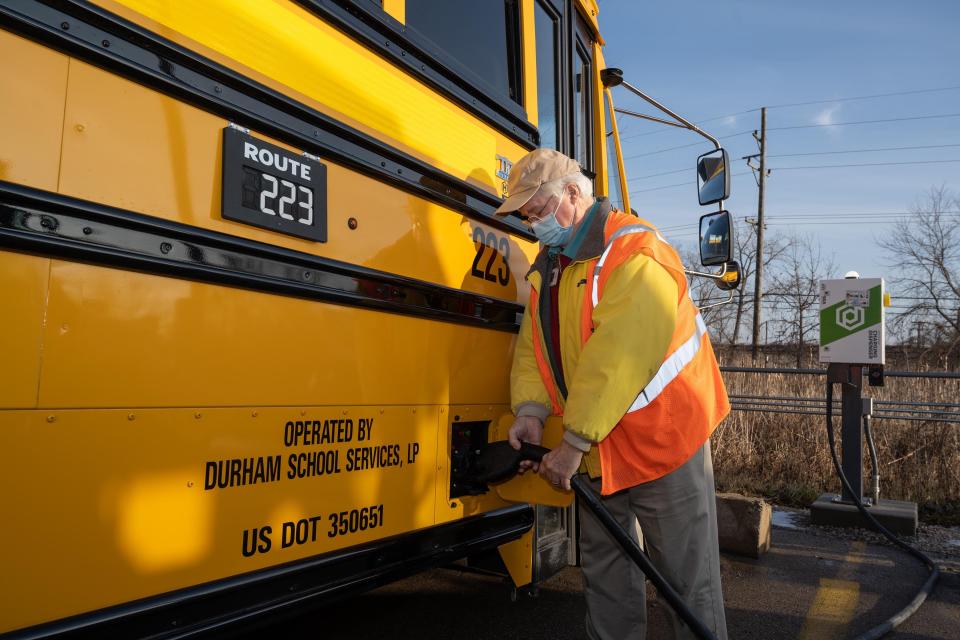Wisconsin is awarded 65 electric school buses. They could reduce costs, CO2 and asthma.

Wisconsin is set to get 65 new electric school buses with federal funds ― reportedly the first ever electric school buses in the state, which has lagged behind others in adopting them.
Districts that applied for funds were picked in a lottery system. Milwaukee Public Schools was among those that applied but didn't make the cut, MPS officials said.
Still, Wisconsin is getting more than most states, as a total of more than 2,400 electric and low-emission school buses are set to roll out across the country, funded with nearly $1 billion from the Bipartisan Infrastructure Law.
While many other states started buying electric school buses about five years ago with payments from the Volkswagen Clean Air Act Civil Settlement, Wisconsin put its money into other transit buses, making the new school buses a historic first for the state, according to the Environmental Law & Policy Center.
Other states have found the electric school buses save money on fuel and upkeep, cut down on emissions and improve children's lung development, said Environmental Law & Policy Center senior policy advocate Susan Mudd.
The biggest barrier, Mudd said, is the upfront cost of the vehicles: about three times the price of diesel buses. That's why the federal funding is such a boon.
Jeff Rykal, superintendent of the Mondovi School District, said the cost is generally a nonstarter for school districts. But with the aid, Rykal said he hopes the district will start saving money.
"Diesel prices are way up right now, so the last two years, really, we've been spending way more on fuel than we have in the past," Rykal said. "And so we're hoping that at this point, we'll see some savings for sure."
What schools are getting electric buses?

Fifteen Wisconsin school districts, or their contractors, won grants for electric school buses. All of them are considered rural school districts.
Milwaukee Public Schools and the state's other urban districts did not win funds. The Environmental Protection Agency picked applicants with a lottery system, with priority for rural districts, schools funded by the Bureau of Indian Affairs, and schools that are considered "high-need" based on the Small Area Income and Poverty Estimates (SAIPE).
Many urban districts that have high rates of poverty by other measures did not make the SAIPE list, including Chicago, Racine and Kenosha. Milwaukee was on the list but didn't get picked in the lottery.
Bob Peterson, MPS School Board president, said the district had applied for the maximum funding to cover 25 buses. He said MPS is on a waiting list for any leftover funds and will look to apply again if given the chance.
The districts getting electric buses are mostly north of Milwaukee and Madison, reaching into the far corners of the state, from Pepin near the Mississippi River to Coleman near the Upper Peninsula.
Wisconsin recipients for electric buses | # Buses | $ Funding |
Augusta Area School District | 3 | $1,185,000 |
Coleman School District | 2 | $790,000 |
Edgar School District | 1 | $395,000 |
Granton Area School District | 5 | $1,885,000 |
Lac du Flambeau #1 School District | 10 | $3,950,000 |
Lakeland UHS School District | 10 | $3,950,000 |
Lomira School District | 4 | $1,580,000 |
Melrose-Mindoro School District | 1 | $395,000 |
Minocqua J1 School District | 12 | $4,740,000 |
Mondovi School District | 5 | $1,975,000 |
Palmyra-Eagle Area School District | 6 | $2,370,000 |
Pepin Area School District | 1 | $395,000 |
Random Lake School District | 1 | $395,000 |
Wild Rose School District | 2 | $790,000 |
Winter School District | 2 | $790,000 |
The districts will need to set up charging stations, also covered by grant funds, before they can make the switch to the electric buses, which could take a year or two.
Four other Wisconsin districts are receiving lesser amounts for lower-emission school buses: Colfax School District, Highland School District, Parkview School District and Tri-County Area School District.
Why go electric?
The top reason some districts applied for funds was simply the cost savings.
Todd Gray, superintendent of the Palmyra-Eagle Area School District, estimated the district could save over $50,000 a year by cutting diesel fuel expenses.
"Our primary goal was to obviously save on the transportation costs," Gray said. "If there's some other benefits, wonderful, but I was looking at it from a cost standpoint."
There are other benefits. Electric buses reduce greenhouse gas emissions that contribute to climate change. And they don't emit other products of diesel, like harmful soot and nitrogen oxides that can lead to breathing problems, headaches and other symptoms.
A 2015 University of Michigan study found that children who rode buses with cleaner air benefitted from more lung growth and less pulmonary inflammation. They even missed less school — especially children with asthma. Researchers estimated that just switching to ultra-low-sulfur diesel school buses could result in 14 million fewer absences per year in the U.S.
"Getting kids out of these old dirty diesel buses is important for children's health, but it's also then important for community health because if your kid has an asthma attack, then the parents often have to miss work," Mudd said. "They have to take them perhaps to the emergency room, so there's sort of a rippling effect."
A 2017 study estimated that each time an asthmatic child has an attack, the child loses three to five school days, and the child’s parents lose the same number of workdays.
Our subscribers make this reporting possible. Please consider supporting local journalism by subscribing to the Journal Sentinel at jsonline.com/deal.
DOWNLOAD THE APP: Get the latest news, sports and more
This article originally appeared on Milwaukee Journal Sentinel: EPA awards Wisconsin 65 electric school buses, could reduce asthma

